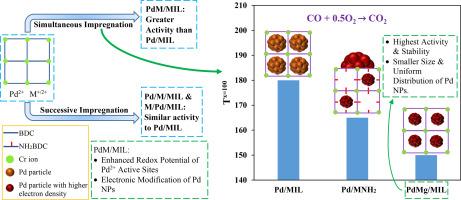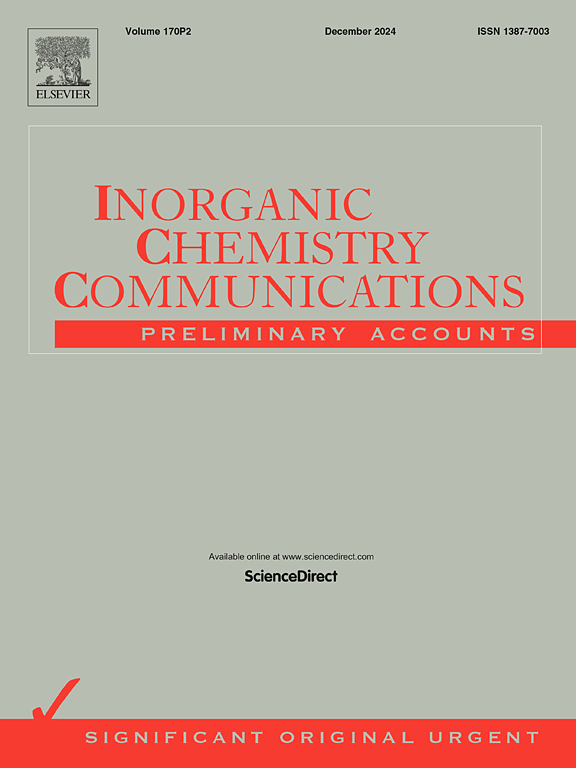共浸渍碱金属和碱土金属对Pd/MIL催化剂CO氧化的促进作用
IF 5.4
3区 化学
Q1 CHEMISTRY, INORGANIC & NUCLEAR
引用次数: 0
摘要
一氧化碳(CO)的催化氧化是环境修复和能源应用的关键过程。虽然金属氧化物通常被用作支撑材料,但金属有机骨架(mof)具有优越的表面积、孔隙率和结构可调性,使其成为探索多相催化中结构-活性关系的绝佳平台。然而,碱和碱土金属(M)促进剂在mof负载催化剂上的作用仍然知之甚少。采用M = Mg, Ca, Ba, K, Cs共浸渍法制备了一系列PdM/MIL-101(Cr)催化剂。系统表征和催化测试表明,即使微量的M金属也可以通过改善Pd的分散和增强Pd -载体的相互作用来显著提高合成过程的催化活性。在所有制备的催化剂中,PdMg/MIL表现出最高的CO氧化性能,在低温下实现了完全的CO转化。与顺序浸渍催化剂(Pd/M/MIL和M/Pd/MIL)的比较证实,同时共浸渍对于将Pd引导到MOF内的高亲和力位点,从而优化活性位点的性质至关重要。本研究提出了一种在mof负载体系中通过低成本的M促进剂共浸渍来提高Pd催化活性的新方法。这些见解为先进的低温氧化催化剂提供了新的设计策略。本文章由计算机程序翻译,如有差异,请以英文原文为准。

Enhanced CO oxidation over Pd/MIL catalysts promoted by co-impregnated alkali and alkaline earth metals
The catalytic oxidation of carbon monoxide (CO) is a key process in environmental remediation and energy applications. Although metal oxides are commonly employed as supports, metal–organic frameworks (MOFs) offer superior surface area, porosity, and structural tunability, making them excellent platforms for exploring structure–activity relationships in heterogeneous catalysis. However, the role of alkali and alkaline earth metal (M) promoters on MOF-supported catalysts remains poorly understood. In this work, a series of PdM/MIL-101(Cr) catalysts were synthesized via co-impregnation using M = Mg, Ca, Ba, K, and Cs. Systematic characterization and catalytic testing revealed that even trace amounts of M metals can significantly enhance catalytic activity by improving Pd dispersion and strengthening Pd–support interaction during synthesis. Among all the prepared catalysts, PdMg/MIL demonstrated the highest CO oxidation performance, achieving complete CO conversion at a low temperature. A comparison with sequentially impregnated catalysts (Pd/M/MIL and M/Pd/MIL) confirmed that simultaneous co-impregnation is essential for guiding Pd to high-affinity sites within the MOF, thereby optimizing the properties of the active site. This study presents a novel approach to enhance Pd catalytic activity via co-impregnation with low-cost M promoters in MOF-supported systems. These insights provide new design strategies for advanced low-temperature oxidation catalysts.
求助全文
通过发布文献求助,成功后即可免费获取论文全文。
去求助
来源期刊

Inorganic Chemistry Communications
化学-无机化学与核化学
CiteScore
5.50
自引率
7.90%
发文量
1013
审稿时长
53 days
期刊介绍:
Launched in January 1998, Inorganic Chemistry Communications is an international journal dedicated to the rapid publication of short communications in the major areas of inorganic, organometallic and supramolecular chemistry. Topics include synthetic and reaction chemistry, kinetics and mechanisms of reactions, bioinorganic chemistry, photochemistry and the use of metal and organometallic compounds in stoichiometric and catalytic synthesis or organic compounds.
 求助内容:
求助内容: 应助结果提醒方式:
应助结果提醒方式:


